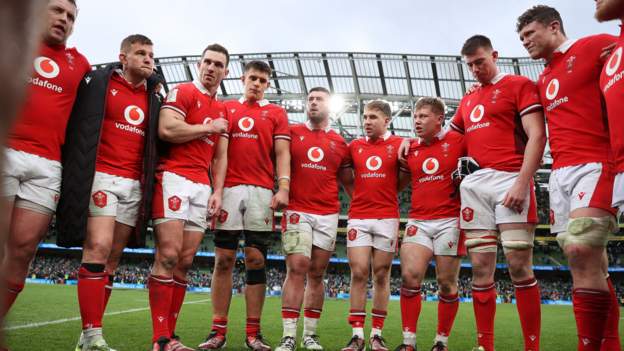Dublin defeat exposes familiar Wales issues
Written by I Dig Sports
In the end, it all went pretty much according to the pre-match script. A 24-point defeat for Wales against Ireland at a Dublin venue where they have now not won in 12 years and six attempts.
The Wales post-match messaging was once again very much the same; talk of a plucky young side learning on the job against one of the best teams in the world.
Wales head coach Warren Gatland stated his team would be an excellent side in the future. Maybe he is right.
For all the current endeavour of this inexperienced Welsh outfit, Ireland demonstrated why currently they are a cut above Gatland's squad.
You cannot hide from the fact Wales have now suffered a third defeat of this year's tournament and this was a 10th loss in 11 Six Nations games.
Such a woeful recent record is similar to some of the dark Five Nations days of Welsh rugby in the 1990s.
Wales can pinpoint positives like the encouraging performances of Dragons number eight Aaron Wainwright and the continued rise of Cardiff full-back Cameron Winnett.
But for all the talk of promising players being given an opportunity and it providing genuine cause for optimism, this latest comprehensive defeat merely highlights the mismanagement of Welsh rugby in the last few years, especially when compared to Ireland's success.
The blame should not be laid at the door of the next generation of players trying to progress on the international stage. Long-term neglect has taken its toll.
Gatland stated before the match the success of the national side had papered over the cracks during his first 12-year stint in charge.
This latest loss demonstrates why it continues to be short-term pain for long-term gain but it is tough being a Welsh supporter at the moment.
Tale of two halves - again
Contrasting 40-minute performances have become one of the themes of Wales' Six Nations tournament so far.
Against Scotland in Cardiff, Wales conceded 27 points in 42 minutes before launching a remarkable comeback which just fell short in a 27-26 defeat.
At Twickenham, Gatland's side enjoyed a first-half lead before letting the advantage slip after half-time and losing 16-14.
In Dublin, Wales trailed 17-0 as Ireland dominated proceedings, overpowering and outmuscling their opponents.
Wales rallied in the second half as they showed character and grit, achieving a penalty try from a rolling maul, but failed to secure a second score which would have put their hosts under pressure.
Discipline issues
Wales conceded nine first-half penalties in that one-sided first half against Ireland. That was the same amount of indiscretions in both games against Scotland and England combined.
Gatland was not impressed by some of the interpretations of referee Andrea Piardi, who became the first Italian official to take charge of a Six Nations match.
"I thought there were a couple of tough calls against us in that first half, so it was difficult to get some momentum," said Gatland.
"If you go through the penalties, we questioned whether some of them were some pretty tough calls.
"We've worked hard in terms of trying to be accurate and not be ill-disciplined, giving away easy ins or outs for the opposition.
"When I looked at a number of those, there were a couple of offsides which are just there, but there's a couple for sealing off which I thought were pretty tough calls.
"You get anyone on both teams on 30 or 40 occasions for exactly the same thing. We've got to take it on the chin."
Blunt attack but brave defence
Wales were not aided by their attacking shortcomings.
"At 17-7, attacking their 22, we didn't come away with anything," said Gatland.
"If we'd come away with something, maybe things might have been closer."
On two occasions in the second half, Wales had opportunities to score with concerted pressure in the Ireland 22.
They failed both times with the second attempt, highlighting a worn-out Wales side lacking the finesse to cross the Irish line in the final moments as "white line" fever took over.
In contrast, Ireland demonstrated a clinical edge with two scores after half-time, including a bonus-point try as the hosts appeared more potent and ruthless in attack.
"We probably weren't as clinical as we wanted to be and didn't impose our attacking game as much as we would have liked," said Gatland.
"There were a few turnovers in a few areas. It didn't give us that opportunity to shift the ball and play, but they're a good side both on defence and attack.
"We didn't create a huge amount of space."
Wales defended well, especially in the first half. This might sound strange when they shipped four tries during the game and missed double the amount of tackles of their opponents.
Wales flanker Tommy Reffell completed 21 tackles, while captain Dafydd Jenkins and centres Nick Tompkins and George North produced some crucial defensive interventions.
Too early to mention wooden spoon?
Wales again find themselves languishing in the bottom half of the Six Nations competition.
They have not finished bottom of the tournament table since 2003 when they suffered the last clean sweep of defeats under Steve Hansen.
Wales have placed fifth in three of the past four tournaments with only one win in each of those competitions.
The 2021 Six Nations success under Wayne Pivac sandwiched in between has proved the exception rather than the rule in recent times.
Gatland's team now face France and Italy, both in Cardiff, in the space of six days in mid-March.
Wales know they have to find a way to win. And quickly.















 Phone: (800) 737. 6040
Phone: (800) 737. 6040 Fax: (800) 825 5558
Fax: (800) 825 5558 Website:
Website:  Email:
Email: 






